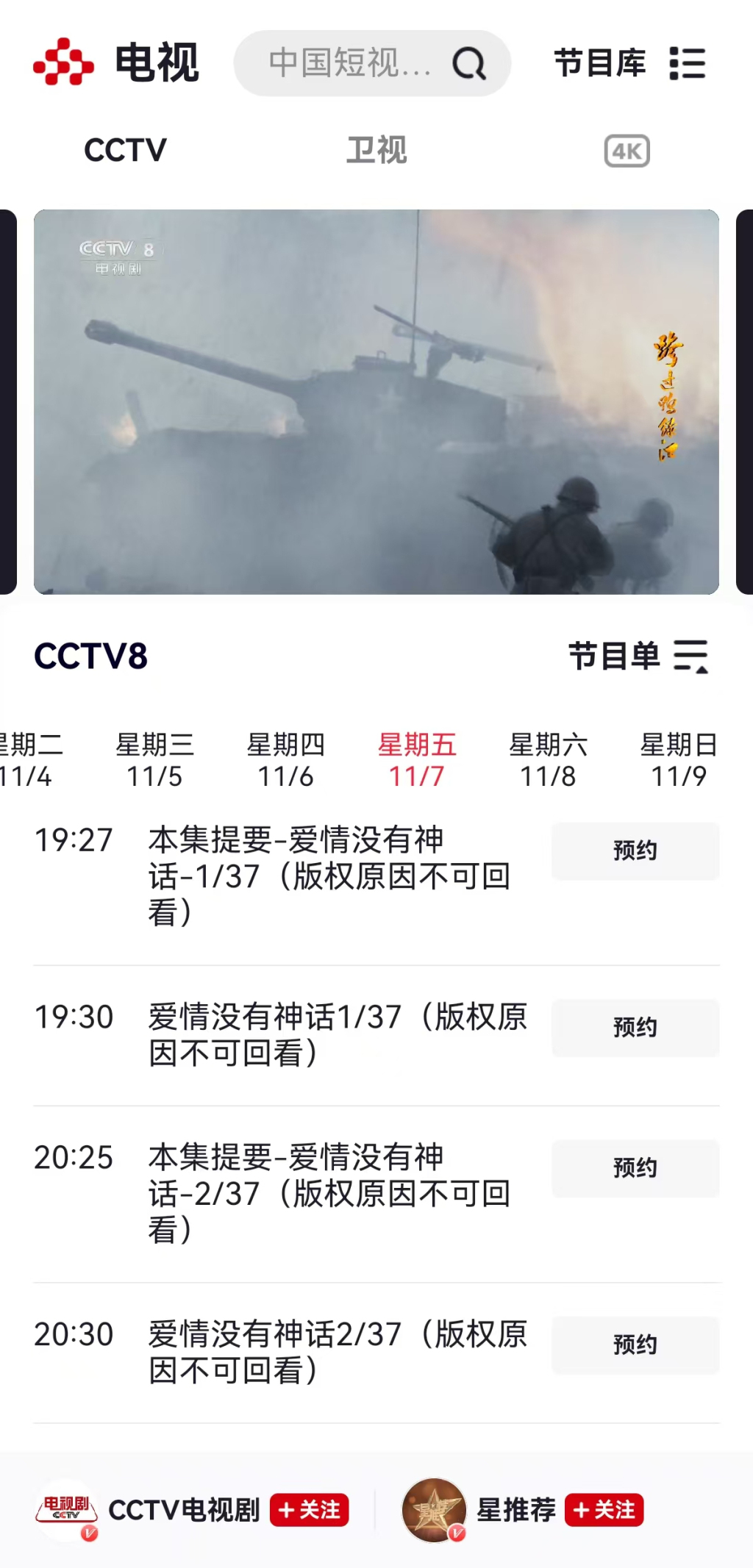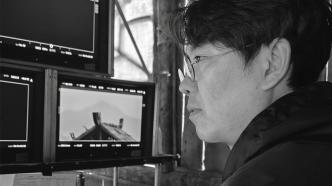
Among the series of comedy works attempted by iQiyi Xiaodou Theater this year, "Don't Panic, My King" is a very outstanding one.
This low-budget production based on the text of "Journey to the West" tells a story set against the backdrop of ancient mythology from the perspective of a small character. "Civil service examination", "social animal", "layoff", "enterprise reform", "wolf culture", when all kinds of current hot words are placed in the background of mythology, the dislocated sense of comedy is natural, and the examination of the current era is also contained in it.
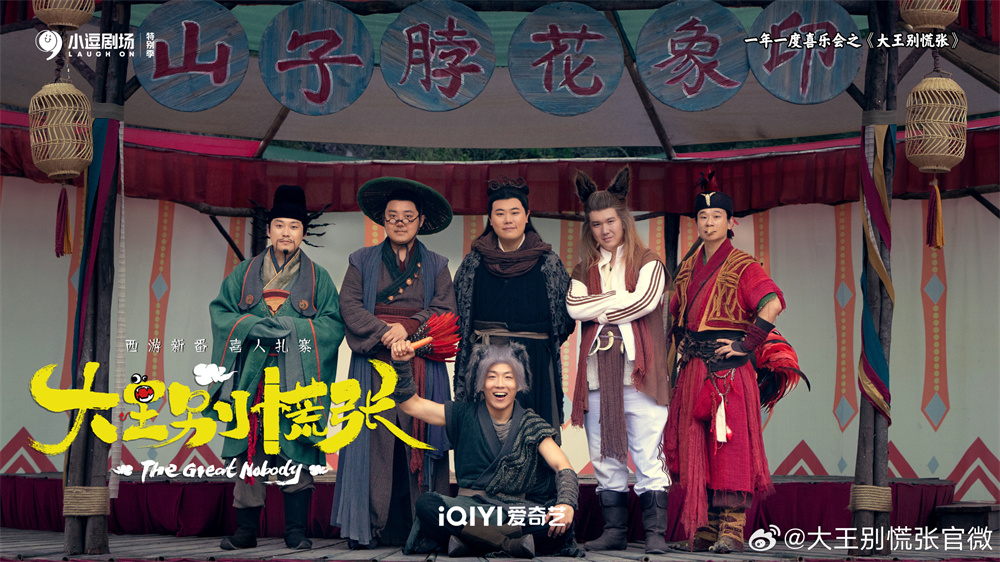
Stills from Don't Panic, My King
Director Jin Zheyong once directed the comedy "Animal Management Bureau", which is still a masterpiece of imagination that comedy fans often watch. Excerpts from it can still be seen on short video platforms.
Someone asked on TikTok, "I've seen so many monsters become spirits, but I've never seen a panda become a spirit." A highly-rated comment below replied, "Haven't you seen "Animal Management Bureau"? Look how ugly the pandas are when they become spirits." This left a deep impression on Jin Zheyong, and he decided that he had to see another "cute" panda become a spirit to "conquer" the audience.
The opportunity came. As soon as the cooperation on the project "Don't Panic, Your Majesty" was confirmed, Jin Zheyong looked at Tu Dou and Lu Yan, the "pleasing" pair, and began to plan their characters in the play.
When the three met, they talked about works such as "Journey to the West", "The Hidden Corner", and "Summer of Little Monsters". They decided on the direction of the story, and in less than a few months, Jin Zheyong wrote the entire script.
With corporate-level rigor, he made top-down structural adjustments to a sloppy monster village in the story. The whole set of reform strategies in diplomacy, military, economy, and personnel were effective, but when put into a comedy structure, it made people laugh and added to the absurdity. The diligent military advisor and the undercover king are a mole spirit and a panda spirit respectively.
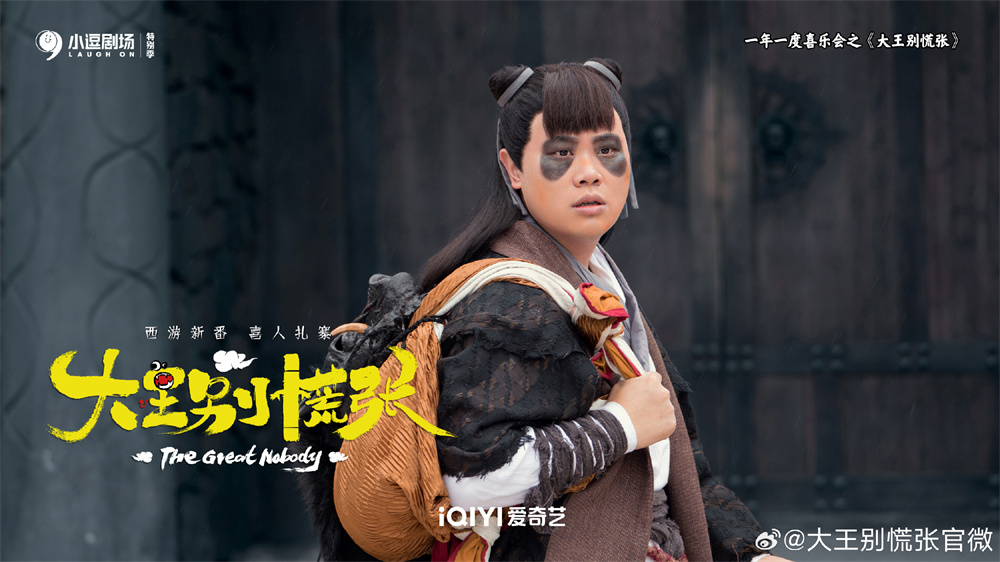
Stills from Don't Panic, My King
The role of the Panda King was a challenge for Lü Yan. He said that when he first saw the "extremely cute" panda in the storyboard, "I was devastated. How could I be so cute? Would the audience be 'disgusted'?"
Jin Zheyong also said with a smile that although Lv Yan and Tu Dou's works in the "Annual Comedy Competition" are all wild and imaginative, when it comes to film and television drama creation, the two are very rigorous and detail-oriented. Especially Lv Yan, he almost discusses the logic of every character with Jin Zheyong, such as why "I always climb trees to contact my superiors", which in turn forces Jin Zheyong to "be quite frustrated", but he understands very well, "Lv Yan will pay attention to the character's state and analyze the character's behavior, because when actors enter the role, there is a process of repeated questioning and repeated acceptance."
However, once the filming started, Lü Yan and Tu Dou's performances became more confident. "The body language, details and rhythm are extremely good, and the more they acted, the more relaxed they felt, and the more it felt like they were leading the play." Jin Zheyong was especially surprised by their performance in the emotional scenes: "Originally, when I was writing the script, I didn't dare to write about emotional scenes, as I thought that as comedians, they might be more averse to scenes with too many emotions. I was also worried that they might not have enough experience to play parts with rich emotions." But unexpectedly, the duo grasped the conflicting emotions of the king and the military advisor in the play quite accurately.
"I was a little surprised at the scene. Is it so good? So detailed? They have a strong sense of belief in their performance." Even Jin Zheyong himself did not expect that as a comedy series, "Don't Panic, Your Majesty" has achieved many tear-jerking emotional highlights.
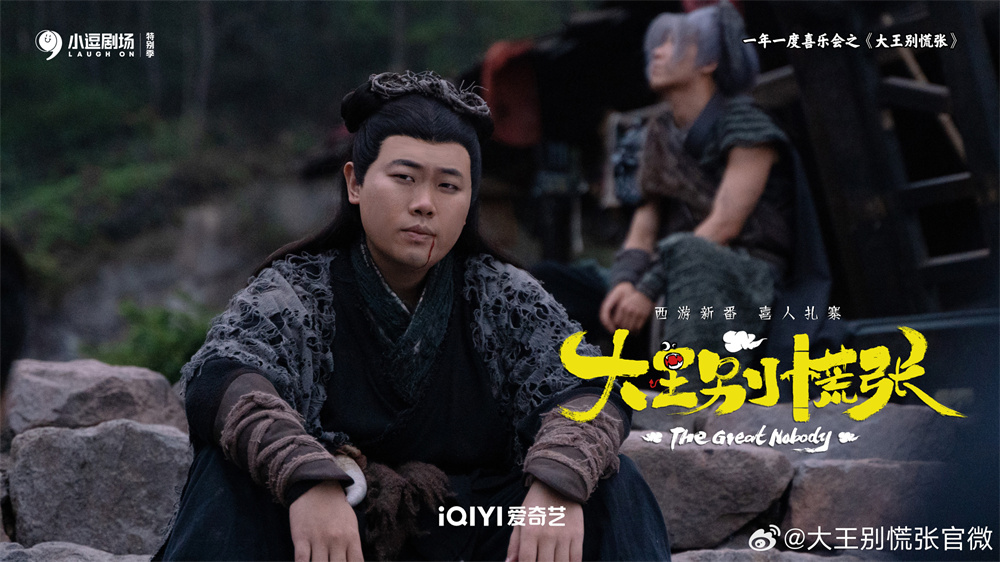
Stills from Don't Panic, My King
In the play, the people of the village sang a chorus to thank the king. After everyone's scenes were shot, Lü Yan was filmed last. Jin Zheyong asked everyone: Who is willing to stay and help Lü Yan? This group of people who have a very good relationship with each other dispersed in a sly voice: Tsk, who will play with him? Everyone left the scene with laughter, and only Lü Yan stayed there quietly, and then said to the camera with nostalgia and sadness: I hope Tang Seng will come slowly.
At that moment, Jin Zheyong felt very good. In his opinion, Tudou and Lu Yan took this seemingly "absurd" story very seriously. "They found the emotions and behavioral motivations that conform to the logic of life in the outrageous logic of the comedy characters."
In addition to Tu Dou and Lü Yan, Jin Zheyong would meet and chat with each actor for a few hours before joining the crew to understand their personalities and characteristics. After understanding, he would make targeted adjustments to the script again. "I don't want this to be a play where 'red flowers match green leaves'. I hope that each of their roles is tailor-made for them."
After the filming started, Jin Zheyong had completely integrated with the actors and had no worries. In the first two days, when some interesting scenes were shot, Jin Zheyong would invite all the actors to the monitor during the break, and everyone would watch while eating sunflower seeds.
For example, in a scene where everyone is running down from the village, Jin Zheyong would put a small speaker somewhere on the scene and play the off-site BGM for the monitor. Everyone would watch and laugh, and then ask Jin Zheyong for another take. One said, "Next time I will never let him steal the show," and another said, "This time I will never let the camera fall on you at the end." The good friends interrupted each other and had a lot of fun.
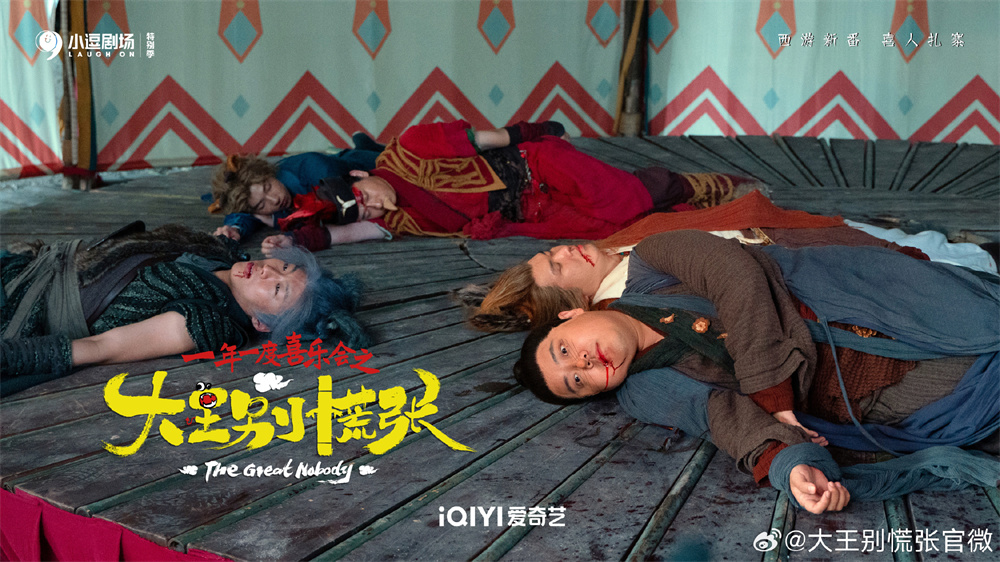
Stills from Don't Panic, My King
"Don't Panic, Great King" is both the title of the drama and the theme song. This theme song is the key to the entire story. Jin Zheyong said that the script had the ending of the last episode first, and then the whole story.
"I first determined the double meaning of 'Da Wang', and then I figured out how to promote the whole story." At the end of the story, facing the invincible Monkey King, the copycat monsters once again sang the song "Don't Panic, Da Wang" to protect their King at all costs. This moment evoked the Monkey King's memory - the call from Huaguo Mountain made him finally turn around and leave with nostalgia, letting the group of little monsters go. The emotions and the theme were sublimated at this moment, which became a very warm and tear-jerking moment in the whole play.
But to achieve this key plot, the song "Don't Panic, Great King" must be highly consistent with the theme and participate in the plot narration. Every character must be involved, and even the lyrics must match everyone's experience. It is almost impossible to find a TV drama example to refer to for this kind of content, and there is no one around to learn from, so we must find a very suitable team to complete it.
Jin Zheyong first thought of the Shanghai Rainbow Chamber Choir. After the connection, the Rainbow Choir was also in a dilemma: they had never done anything like this. Jin Zheyong wrote a long letter to the choir leader Jin Chengzhi, detailing the story and theme of "Don't Panic, Great King", and describing every character from the protagonist to the supporting role, what kind of person they are, what kind of experience they have, what they often say... Everything is described in detail.
Finally, Jin Zheyong expressed his love for the Rainbow Choir in the letter: starting from personal emotions, they tactfully evoked everyone's common memories, and then generated a strong emotional resonance with the public. "This is a very remarkable thing, and we sincerely and urgently hope that this kind of remarkable thing can also come into our story." A week later, Jin Chengzhi and his team made this song.
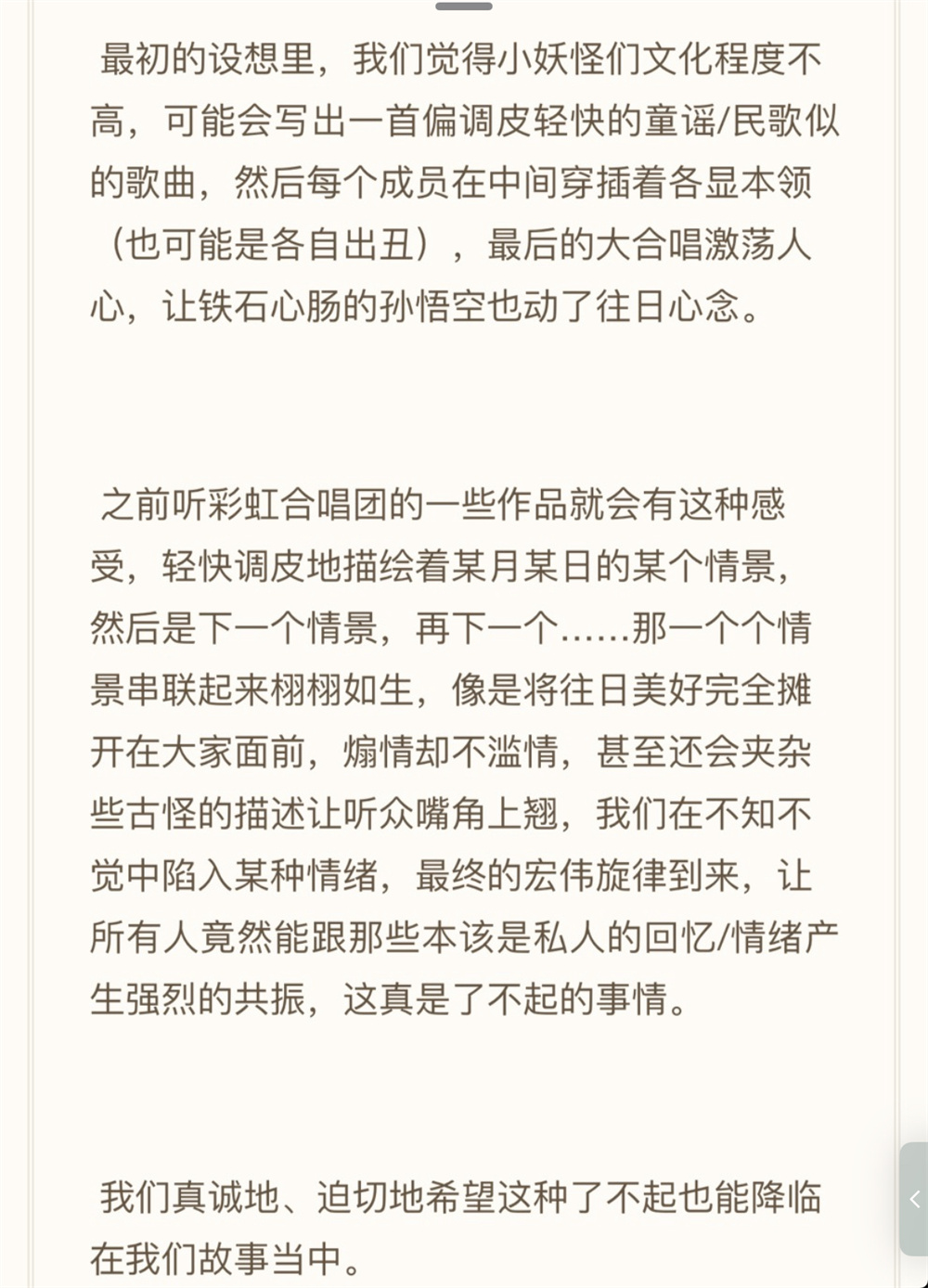
Screenshot of the long letter from Jin Zheyong to Jin Chengzhi
On the day of filming, the actors sang this song, all of them were sad, the staff on the scene also cried, and even the "tough guy" photography teacher was behind the camera, pushing his hat down to cover his red eyes. The protagonist Lv Yan's makeup was all smudged by tears. "A panda cried its own 'panda eyes' away," Jin Zheyong said with a smile, "Although it feels a bit alienated, it also shows that his performance at that moment was extremely sincere."
During the interview, when talking about the pain and joy of comedy creation, Jin Zheyong said a very lovely statement: "Comedy is a 'door to anywhere' that can lead to freedom everywhere."
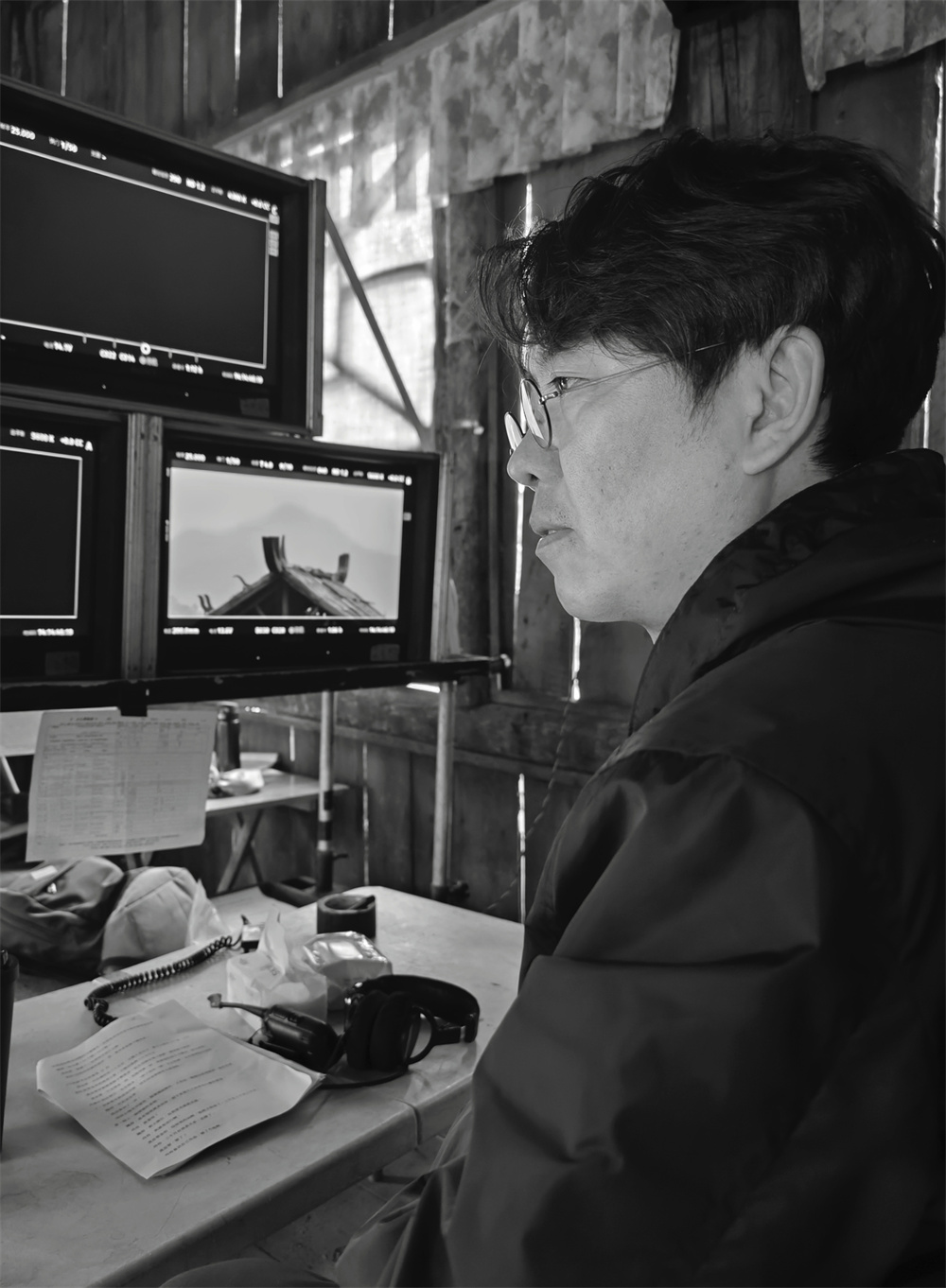
Director Jin Zheyong working photo
【dialogue】
Beyond life, yet close to life
The Paper : The characters of the panda and the mole are quite unique. Can you talk about the creation process?
Jin Zheyong : When I was writing the script, it happened to coincide with the "Yaya, Let's Go Home" event, and pandas were very popular. And a king who seemed to "do nothing", but everyone just liked him and thanked him, this image seemed to fit pandas very well. Sometimes the actors even asked: What did the king bring us? Why are we so grateful to him? Obviously, it was the mole master who should be thanked?
Sometimes it is like this, when you change a leader, you don’t have to look at what he does, just look at what he doesn’t do and what he allows to do, which may bring about huge changes. Then I thought, what other animal should the panda be paired with? I thought of the mole again, which is blind but bright-minded, very smart, and has the brilliance of an intellectual, but sometimes because it has been underground for a long time, it can’t see the essence of things clearly. And the round image is a bit like the state of the potato at that time.
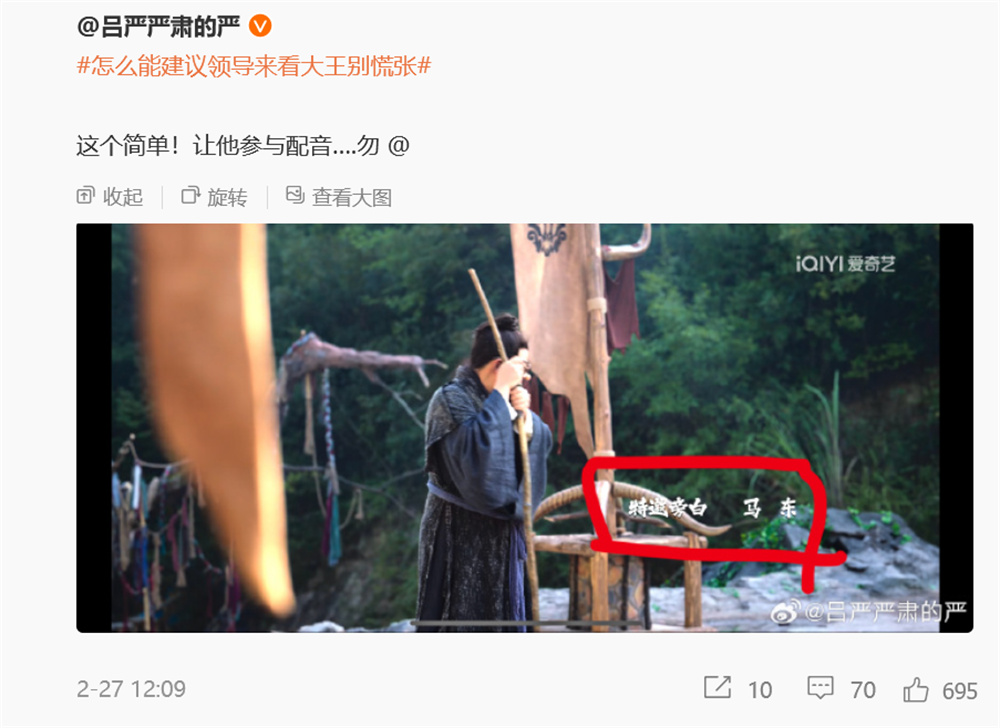
Let the "leader" Ma Donglai provide the narration.
The Paper : It was actually quite unexpected that Ma Donglai was the narrator. But this format was also questioned by some viewers.
Jin Zheyong : When the sense of form is taken to an extreme, it can sometimes make people uncomfortable. They may think that when the picture has been conveyed, the narration is destroying the situation? Is the narration narrative not advanced? I can understand this because I sometimes say this when I comment on other people's films (laughs).
But there was no other way. At the time, I really wanted to do a narration that imitated "The Hidden" or a bit like "The Harvest" literature. At first, I wanted to use this kind of narration to do something satirical, but after the whole story was filmed, I found that it was not that kind of cold temperament, but the temperature was quite high, so the satirical narration was not so established.
So when I asked Mr. Ma Dong to voice the story, I suggested that he could bring some warmth to the story, giving the feeling of an elder who is paying attention to Linglong Tower and Mole Master and how they move forward. This could form an intertextuality with their lovely real life, and maybe also make this group of lovely fans feel the "team spirit".
The Paper : You used a lot of complex contemporary situations, details, and images in the play. Is it difficult to unify these in a monster village with the background of Journey to the West?
Jin Zheyong : Yes, I think this is the most important and the most difficult thing. When I first created it, I hoped that the audience would not regard it as a costume drama, but as a myth, a fable, an existence that is beyond our lives but close to life. Even the first sentence of our opening, "This is an afternoon more than a thousand years ago", is to give the audience such a hint. Including in the music, I require that the so-called ancient style and rhyme must not appear, and try to keep it contemporary, so that the audience feels that this story is not alienated from themselves.
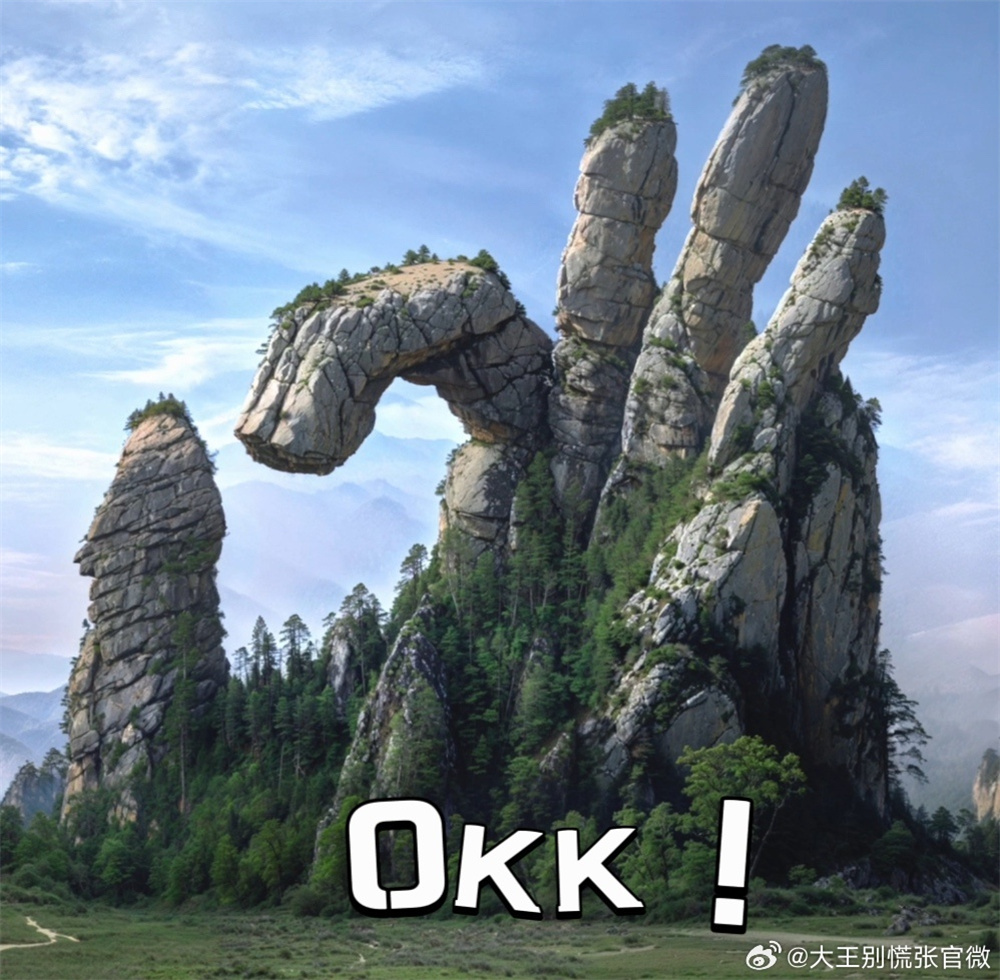
Don't Panic, My King
Drama comes before joy
The Paper : From this play, we can see the influence of the short video era on comedy creation. As a comedy creator, what are your observations and thoughts on comedy in the short video era?
Jin Zheyong : The key to comedy's punchline, the so-called contrast effect of comedy, is that it gives you something fun and unexpected before you even realize it. But in this era of high-speed information dissemination, as soon as you say the first word, I already know what your punchline is. It's becoming increasingly difficult to create that kind of unexpected contrasting joke.
So what kind of comedy can continue to go on? In my opinion, it is still the "drama" that comes before the "fun". A good comedy must first be a good drama. Compared with short video clips, the advantage of long series lies in your theme and the immersiveness of your whole story.
For comedy creation, we need to evolve, but the direction of evolution may not be to create funnier jokes, but to tell better stories. In the creation, we put in real emotions, and when the audience watches, they also put in real emotions, and they feel a long-lasting mood. To achieve such an effect, the most important force of the series is still the story.
The power of stories can never be replaced, it just keeps changing its form or finding a better way to express it.
The Paper : Speaking of “evolution,” what comedy needs to do is not to keep up with the popular jokes of the era, but to keep up with some social observations and social phenomena of the entire era?
Jin Zheyong : We still have to follow the feeling of the times. We ourselves are also feeling the times. Some jokes, such as those Internet slangs, you used them and thought they were quite trendy and funny, but they may become outdated after a few months. Of course, they will remain in our creations, and the audience can also see the traces of their existence, becoming a witness of the times. Comedy masters of every era are excellent observers of the times and society.
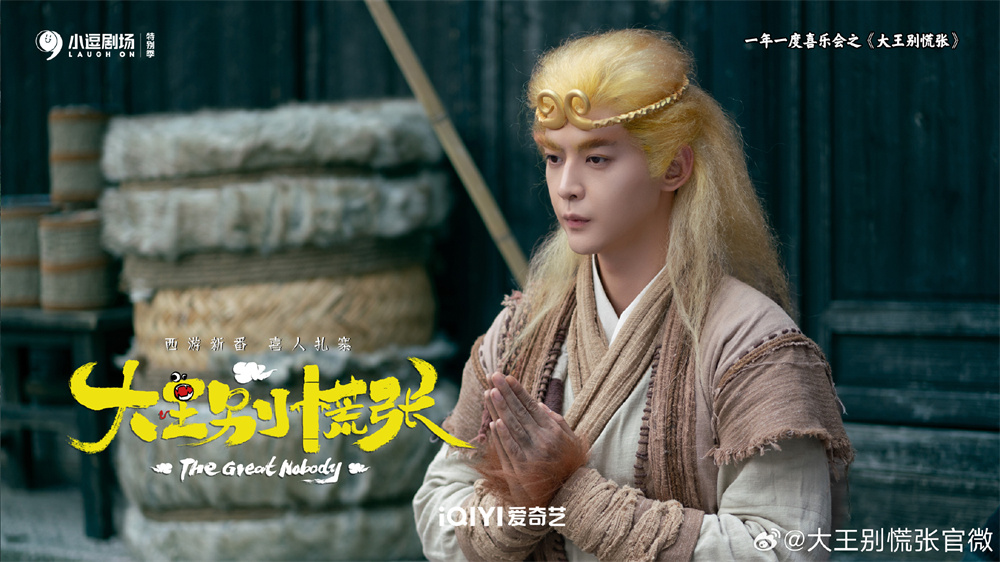
Stills from Don't Panic, My King
Maintaining the “handmade feel” of comedy creation
The Paper : What makes comedy creation different from other types of creation seems to be that it requires a high degree of consistency in every aspect of writing, directing and editing?
Jin Zheyong : In the creation process of comedy, to maintain the accuracy of its expression, a "handmade feeling" is needed, and it cannot be purely handed over to an industrialized production line. Because in the whole process of comedy creation, if there is a link in the process that the person in charge does not understand comedy, or the comedy concept is inconsistent, there will be huge production deviations.
For example, one of our producers watched the post-production with me when the show was about to be aired, and then he suddenly realized that "Sun Wukong" and "Swooping" are double rhymes and homophones. I laughed: What else? Another example is that during the post-production, the editor edited alone for a few days. I came back and saw that several important comedy scenes were cut out. I asked the editor why, and he said that the rhythm was faster after cutting it out. I said: But we edited a comedy.
I can only try my best to make sure the editing and directing are together, and be present at every key link in the production chain, and sort out the rhythm and structure. At least this can avoid the situation where the script has one logic, the actors' performances have another logic, and then the editing rhythm has yet another logic in the later stages.
The Paper : Comedy is very difficult. In addition to having strong production skills, it also requires a group of people to have the same comedic feelings and aesthetics to make a good comedy.
Jin Zheyong : This is also one of the reasons why comedy is difficult to make in this era, because everyone emphasizes industrialization and process-based production, but when you make a comedy, sometimes you need some "handmade feel", which is actually a bit too energy-consuming, and there may be an imbalance between income and expenditure.
When I do other genres, you may feel that it is very brain-burning before I put in much effort; and you may feel that the picture is very beautiful as soon as the lights are turned on and the camera is set up. When I do comedy, I may put in a lot of effort, but the final result may be: it is OK, a little funny. You will feel: ah, I have to work so hard, and you find it a little funny.
But many times, other themes can't give me the same creative pleasure of comedy. You can write about your observations, opinions, interpersonal relationships, and people's mentality in life, and do it in a lighthearted way. I think it has a little more "refreshing" feeling than other themes.
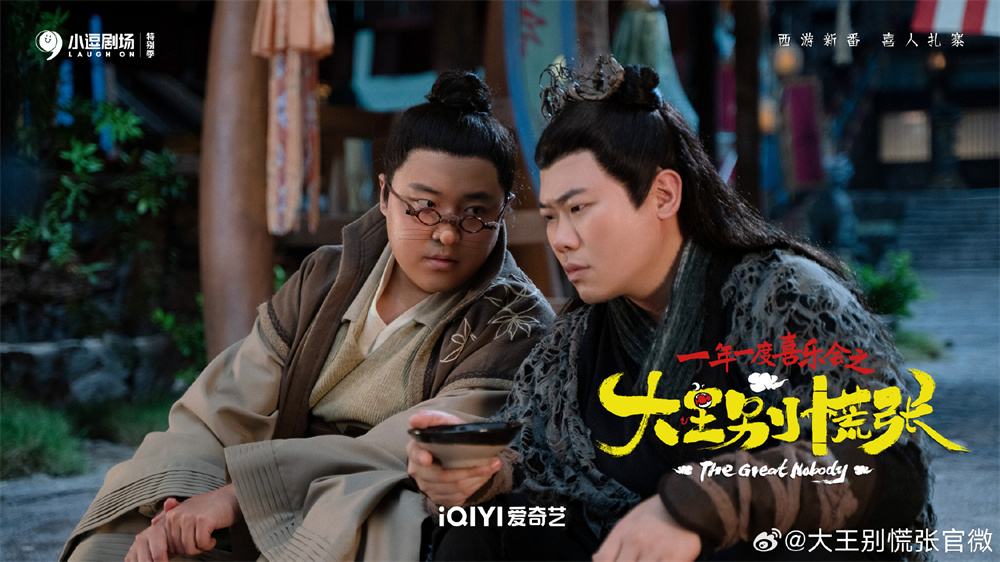
Stills from Don't Panic, My King
“Where is the road?” First, we must “dare to ask”
The Paper : It is true that this play is highly connected to our current reality, and we can see some irony and observations. I would also like to talk about your thoughts on comedy creation?
Jin Zheyong : In my opinion, comedy is a "door to anywhere". Sometimes in the creation process, you can go to places that you can't go on foot, places of imagination and freedom that realistic logic can't reach, through this door to anywhere. Those things in life exist in themselves, especially since the emergence of short videos, people can feel the absurdity of life everywhere. Comedy is a seasoning for finding joy in suffering, especially the absurd satire in comedy, which is a bit like a snack to go with wine. Although it is spicy, it is also quite refreshing, adding some flavor to life, and finally laughing and drinking a glass of wine will make it go smoothly.
The Paper : Many people say that comedy is an art of offending, but in our current public opinion environment, it is not easy to offend anything. Do you feel that the creative space for comedy has been compressed?
Jin Zheyong : Many times when we started creating, we didn’t intend to offend anyone. Isn’t life like this? We just showed it, and it’s not ironic.
If you just complain and say a few words that are not very serious, this kind of satire is meaningless. After the satire, what do you want to say the most? You can't just curse a few words and leave.
The theme is also very important in comedy expression. All offense or irony must fall back on the theme of the text itself. It will ultimately come down to a result. When the result does not emerge, the so-called irony may become a simple offense.
Of course, I am not qualified to teach others, but in my own work, I have my own conclusion from the heart: I have made so many jokes, and in the end I want to say a few words from the heart, at least everyone is willing to listen to this.
The Paper : Whether it is offensive or ironic, it ultimately serves the purpose of expressing the theme. What do you most want to express with this story?
Jin Zheyong : When I created this play, the epidemic had just ended, and you would inevitably think about this era and the world. At that time, people were restless and uncertain. Then a new era began, and we were still a little confused most of the time.
I am the same. In the past few years, I didn't have much work and stayed at home. At that time, I thought: should I go back to my hometown? Should I change my industry? Or should I just take on some projects that I don't like and make a little money to live? I think that everyone needs comedy and needs to be less panic. I don't have the confidence to say this myself, but at least we should work hard in this direction, right?
In this story, each of these little people has an unrealistic dream, such as the Rabbit Lord's desire to fight with Sun Wukong, and the Mole Master's broken glasses, which are so broken that he can't even see anything, but he still wants to save the village. They are dreaming, but the times have changed. But what can they do? The monsters in the play, whether they are building a tourist area, working undercover, or revitalizing Huabozi Mountain, need a goal to unite and move forward.
So from the first episode to the end, what I want to talk about is the song "Where is the Road" from the 1986 version of "Journey to the West". Maybe we haven't found the answer yet, but at least our attitude is "don't panic", because "Where is the Road" is the first sentence to ask, and only by asking this question can we have the next sentence "The road is under our feet". We must always move forward bravely to know where the road is.
When I saw the last scene of the play and everyone was taking screenshots and forwarding it, I knew that everyone was eager to have a clearer goal and a more down-to-earth feeling. It can play a role in comforting people. In fact, as a short play, it has achieved its purpose. I also wish everyone not to panic, keep their feet on the ground, and one day, find a position that suits them.
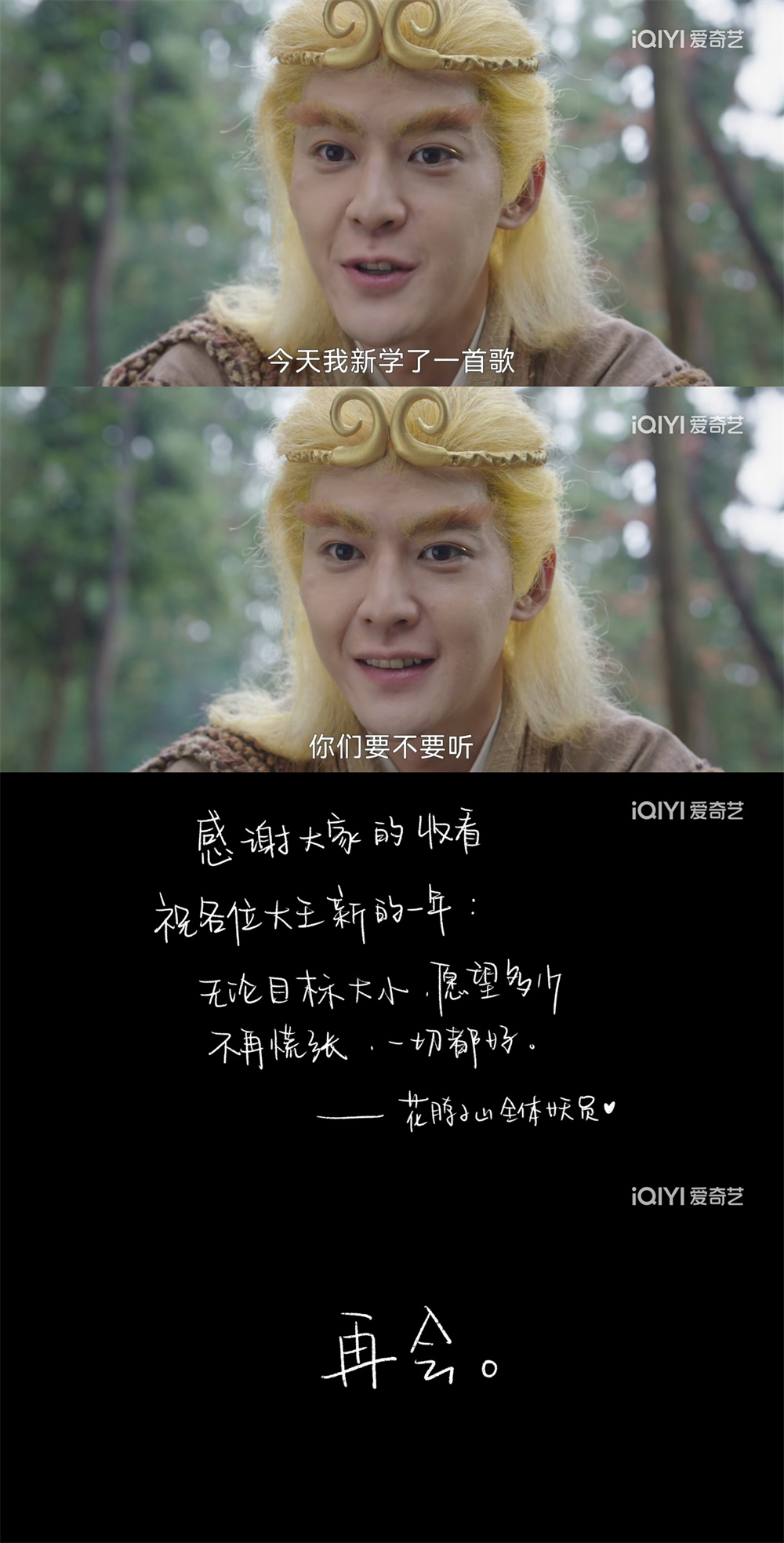
"I wish all the kings a happy new year: no matter how big or small your goals are, no matter how many wishes you have, don't panic anymore, everything will be fine. - All the monsters of Huabozi Mountain (heart)"


